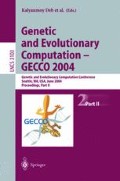Abstract
This paper investigates the linkage model building for genetic algorithms. By assuming a given quality of the linkage model, an analytical model of time to convergence is derived. Given the computational cost of building the linkage model, an estimated total computational time is obtained by using the derived time-to-convergence model. The models are empirically verified. The results can be potentially used to decide whether applying a linkage-identification technique is worthwhile and give a guideline to speed up the linkage model building.
Access this chapter
Tax calculation will be finalised at checkout
Purchases are for personal use only
Preview
Unable to display preview. Download preview PDF.
References
Holland, J.H.: Adaptation in natural and artificial systems. University of Michigan Press, Ann Arbor (1975)
Goldberg, D.E.: The design of innovation: Lessons from and for competent genetic algorithms. Kluwer Academic Publishers, Boston (2002)
Harik, G.R., Goldberg, D.E.: Learning linkage. Foundations of Genetic Algorithms 4, 247–262 (1996)
Munetomo, M., Goldberg, D.E.: Identifying linkage groups by nonlinearity/nonmonotonicity detection. In: Proceedings of the Genetic and Evolutionary Computation Conference 1999, vol. 1, pp. 433–440 (1999)
Pelikan, M., Goldberg, D.E., Lobo, F.G.: A survey of optimization by building and using probabilistic models. IlliGAL Report No. 99018, University of Illinois at Urbana-Champaign, Illinois Genetic Algorithms Laboratory, Urbana, IL (1999)
Larrañaga, P., Lozano, J.A. (eds.): Estimation of distribution algorithms: A new tool for evolutionary computation. Kluwer Academic Publishers, Boston (2002)
Yu, T.-L., Goldberg, D.E., Yassine, A.: Genetic algorithm design inspired by organizational theory: Pilot study of a dependency structure matrix driven genetic algorithm. In: Proceedings of Artificial Neural Networks in Engineering 2003 (ANNIE 2003), pp. 327–332 (2003) (Also IlliGAL Report No. 2003007)
Ocenasek, J., Schwarz, J., Pelikan, M.: Design of multithreaded estimation of distribution algorithms. In: Proceedings of the Genetic and Evolutionary Computation Conference (GECCO-2003), pp. 1247–1258 (2003)
Sastry, K.: Evaluation-relaxation schemes for genetic and evolutionary algorithms. Master thesis, University of Illinois at Urbana-Champaign, Urbana, IL (2002)
Pelikan, M.: Bayesian optimization algorithm: From single level to hierarchy. Doctoral dissertation, University of Illinois at Urbana-Champaign (2002)
Smith, J., Fogarty, T.C.: Recombination strategy adaptation via evolution of gene linkage. In: Proceedings of the 1996 IEEE International Conference on Evolutionary Computation, pp. 826–831 (1996)
Harik, G.R., Cantú-Paz, E., Goldberg, D.E., Miller, B.L.: The gambler’s ruin problem, genetic algorithms, and the sizing of populations. In: Proceedings of 1997 IEEE International Conference on Evolutionary Computation, pp. 7–12 (1997)
Harik, G.R.: Linkage learning via probabilistic modeling in the ECGA. IlliGAL Report No. 99010, University of Illinois at Urbana-Champaign, Illinois Genetic Algorithms Laboratory, Urbana, IL (1999)
Mühlenbein, H., Schlierkamp-Voosen, D.: Predictive models for the breeder genetic algorithm: I. Continuous parameter optimization. Evolutionary Computation 1, 25–49 (1993)
Thierens, D., Goldberg, D.E.: Convergence models of genetic algorithm selection schemes. In: Davidor, Y., Männer, R., Schwefel, H.-P. (eds.) PPSN 1994. LNCS, vol. 866, pp. 119–129. Springer, Heidelberg (1994)
Miller, B.L.: Noise, sampling, and efficient genetic algorithms. Doctoral dissertation, University of Illinois at Urbana-Champaign, Urbana (1997)
Deb, K., Goldberg, D.E.: Analyzing deception in trap functions. Foundations of Genetic Algorithms 2, 93–108 (1993)
Blickle, T., Thiele, L.: A mathematical analysis of tournament selection. In: Proceedings of the Sixth International Conference on Genetic Algorithms, pp. 9–16 (1995)
Author information
Authors and Affiliations
Editor information
Editors and Affiliations
Rights and permissions
Copyright information
© 2004 Springer-Verlag Berlin Heidelberg
About this paper
Cite this paper
Yu, TL., Goldberg, D.E. (2004). Toward an Understanding of the Quality and Efficiency of Model Building for Genetic Algorithms. In: Deb, K. (eds) Genetic and Evolutionary Computation – GECCO 2004. GECCO 2004. Lecture Notes in Computer Science, vol 3103. Springer, Berlin, Heidelberg. https://doi.org/10.1007/978-3-540-24855-2_32
Download citation
DOI: https://doi.org/10.1007/978-3-540-24855-2_32
Publisher Name: Springer, Berlin, Heidelberg
Print ISBN: 978-3-540-22343-6
Online ISBN: 978-3-540-24855-2
eBook Packages: Springer Book Archive

